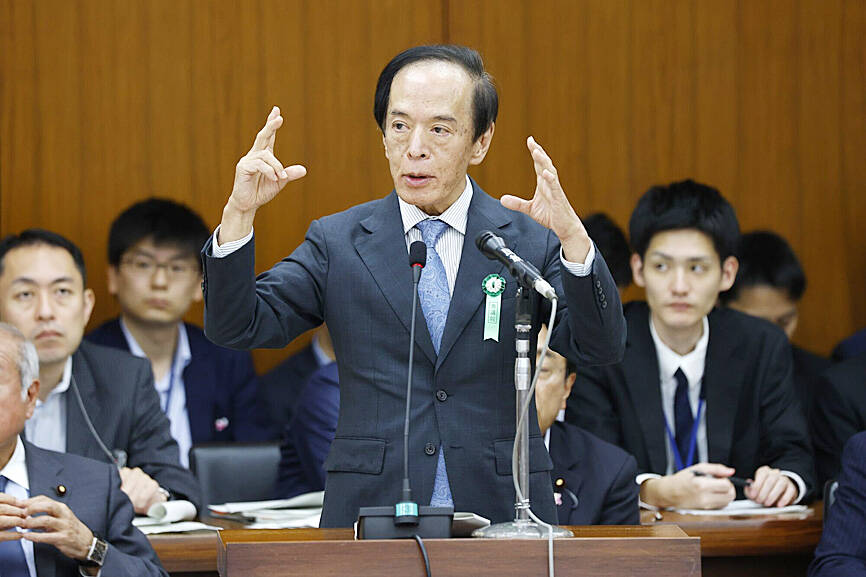Bank of Japan (BOJ) Governor Kazuo Ueda kept rate hikes in play this year by turning a potentially messy parliamentary hearing into a relatively straightforward reiteration of policy in his first public remarks following a global stock market rout.
“If we are able to confirm a rising certainty that the economy and prices would stay in line with forecasts, there is no change to our stance that we would continue to adjust the degree of easing,” Ueda said in response to questions from lawmakers yesterday.
When asked about the market ructions that occurred earlier this month, Ueda played down the significance of the BOJ’s rate hike last month, citing concerns over the state of the US economy as the key catalyst, adding that the “overdone” worries have since eased.

Photo: Bloomberg
At the same time, he signaled that he does not plan to rush ahead with the next rate hike, saying the BOJ needs to carefully watch the impact of unstable financial markets on the inflation outlook.
The governor’s remarks suggest that the sharp market tumbles early this month would not deter authorities from considering more interest rate increases as the central bank unwinds years of ultra-easy policy, even if the next move is not imminent.
Ueda is sticking to his view that the central bank would hike rates if the economy meets expectations, rather than needing economic data to exceed forecasts to trigger policy moves, said David Forrester, a senior strategist at Credit Agricole CIB in Singapore.
“The fact that Ueda is sticking to this rhetoric despite recent financial market turbulence is positive for the yen,” Forrester said. “He showed no regret about the rate hikes to date and signaled the central bank will raise rates further if data continue to track its projections. The takeaway — recent volatility in stocks and the yen hasn’t derailed the plans to normalize policy.”
While the BOJ is widely expected to stand pat on policy when the board meets next month partly to avoid any market ripples when Japan’s ruling party chooses a new leader, many surveyed economists expect the bank to increase borrowing costs again by December.
Ueda’s comments on watching markets for now echoed remarks delivered by his deputy, Shinichi Uchida, earlier this month when the central bank was looking to reassure jittery investors. Still, the governor stopped short of repeating Uchida’s pledge not to raise rates when markets are unstable.
Instead he pledged to carefully communicate the bank’s thinking to ensure market participants are not taken by surprise.
“We will watch financial markets with an extremely high sense of urgency for the time being,” he said.
“For those market participants looking for some comments as dovish as Uchida’s, his remarks were a little negative, but the impact was limited,” Pictet Asset Management Japan Ltd strategist Jumpei Tanaka said.
The BOJ has been criticized by those who said the July 31 hike and Ueda’s post-decision pledge to continue raising rates if conditions allow were key factors that triggered a massive sell-off on global financial markets days later.

With an approval rating of just two percent, Peruvian President Dina Boluarte might be the world’s most unpopular leader, according to pollsters. Protests greeted her rise to power 29 months ago, and have marked her entire term — joined by assorted scandals, investigations, controversies and a surge in gang violence. The 63-year-old is the target of a dozen probes, including for her alleged failure to declare gifts of luxury jewels and watches, a scandal inevitably dubbed “Rolexgate.” She is also under the microscope for a two-week undeclared absence for nose surgery — which she insists was medical, not cosmetic — and is

CAUTIOUS RECOVERY: While the manufacturing sector returned to growth amid the US-China trade truce, firms remain wary as uncertainty clouds the outlook, the CIER said The local manufacturing sector returned to expansion last month, as the official purchasing managers’ index (PMI) rose 2.1 points to 51.0, driven by a temporary easing in US-China trade tensions, the Chung-Hua Institution for Economic Research (CIER, 中華經濟研究院) said yesterday. The PMI gauges the health of the manufacturing industry, with readings above 50 indicating expansion and those below 50 signaling contraction. “Firms are not as pessimistic as they were in April, but they remain far from optimistic,” CIER president Lien Hsien-ming (連賢明) said at a news conference. The full impact of US tariff decisions is unlikely to become clear until later this month

GROWING CONCERN: Some senior Trump administration officials opposed the UAE expansion over fears that another TSMC project could jeopardize its US investment Taiwan Semiconductor Manufacturing Co (TSMC, 台積電) is evaluating building an advanced production facility in the United Arab Emirates (UAE) and has discussed the possibility with officials in US President Donald Trump’s administration, people familiar with the matter said, in a potentially major bet on the Middle East that would only come to fruition with Washington’s approval. The company has had multiple meetings in the past few months with US Special Envoy to the Middle East Steve Witkoff and officials from MGX, an influential investment vehicle overseen by the UAE president’s brother, the people said. The conversations are a continuation of talks that

CHIP DUTIES: TSMC said it voiced its concerns to Washington about tariffs, telling the US commerce department that it wants ‘fair treatment’ to protect its competitiveness Taiwan Semiconductor Manufacturing Co (TSMC, 台積電) yesterday reiterated robust business prospects for this year as strong artificial intelligence (AI) chip demand from Nvidia Corp and other customers would absorb the impacts of US tariffs. “The impact of tariffs would be indirect, as the custom tax is the importers’ responsibility, not the exporters,” TSMC chairman and chief executive officer C.C. Wei (魏哲家) said at the chipmaker’s annual shareholders’ meeting in Hsinchu City. TSMC’s business could be affected if people become reluctant to buy electronics due to inflated prices, Wei said. In addition, the chipmaker has voiced its concern to the US Department of Commerce